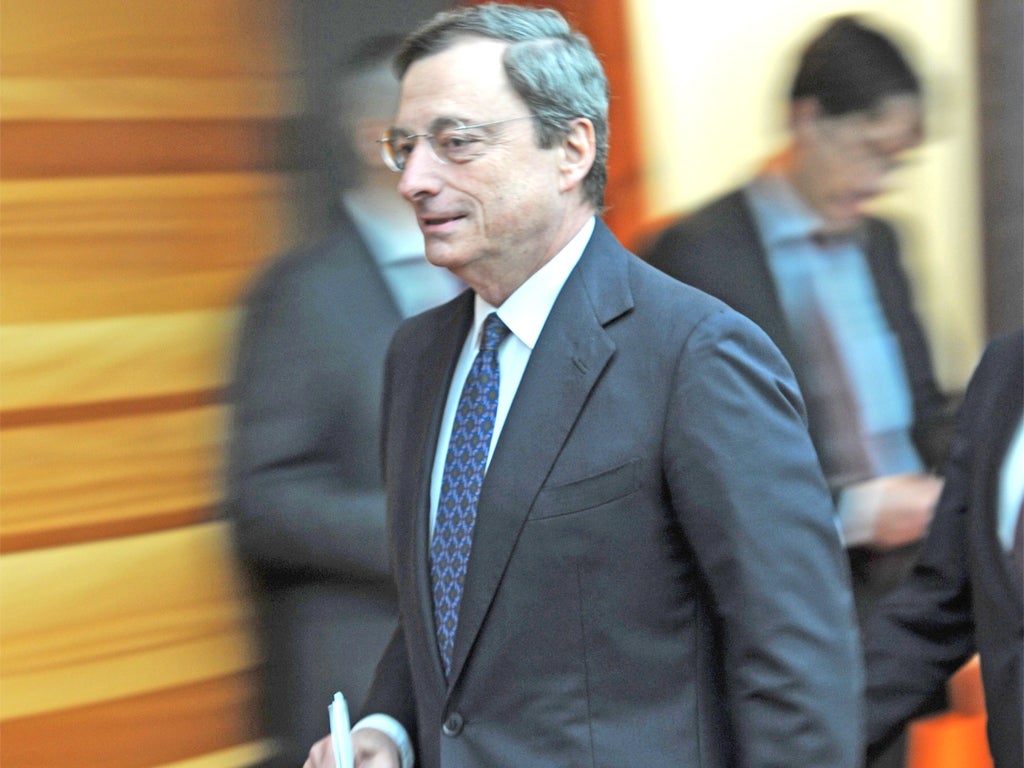European Central Bank President Mario Draghi unveils eurozone rescue plan

A rescue plan for the eurozone was launched today amid more dire warnings about the impact the debt crisis is having on the UK economy.
The European Central Bank said it will buy up government bonds of eurozone countries to help bring down their borrowing rates.
It represents the clearest sign yet that ECB president Mario Draghi is willing to live up to his pledge to do "whatever it takes" to save the single currency.
Investors cheered the decision as European stock markets surged, with the FTSE 100 Index up nearly 2%, Germany's Dax ahead 2.6% and France's Cac-40 adding nearly 3%.
The move came as think-tank the Organisation for Economic Co-operation and Development warned the eurozone remained "the most important risk for the global economy".
The ECB decision is likely to irk the German government as the scheme has faced intense opposition from German central bank chief Jens Weidmann, who believes it falls outside the ECB's mandate.
The yields on Spanish and Italian 10-year bonds dropped after the announcement, in a sign the move had restored confidence in some investors, while European stock markets remained firmly ahead.
Carsten Brzeski, economist at ING Bank, said: "All in all, the ECB has presented a big new bazooka which should help buying time."
Earlier in London, the Bank of England refrained from boosting its quantitative easing programme at £375 billion and held interest rates at record lows of 0.5%.
The ECB programme, which will be known as the Outright Monetary Transaction, will replace the previous programme and see the central bank buying bonds between one and three-year terms and will have no limits.
Participating countries that have their bonds bought will have to accept certain conditions which will be part-monitored by the International Monetary Fund.
The no-change decision at the Bank of England came after positive manufacturing and services surveys revealed tentative signs of a recovery - but this was dampened after the OECD slashed its UK growth forecast for this year.
The think-tank expects the UK will fail to pull out of its double-dip recession in the current quarter, which will see a 0.7% decline on an annualised rate, compared with previous expectations of a 0.5% decline.
Most economists have predicted a further QE boost in November, after the current run of asset purchases is completed, while some believe a rate cut is on the cards.
Anna Leach, CBI head of economic analysis, said: "We would need only a relatively small deterioration in economic conditions to prompt a further extension of the asset purchase programme later this year."
The Bank also recently admitted that QE has increased the fortunes of the wealthiest 5% of Britons.
Ros Altmann, director-general of Saga, said the Bank was wrong to suggest that pensioners have not lost out and said QE was causing "significant economic damage".
Aside from recent surveys, there has been little change in the economic outlook since the MPC's last meeting, although SSE's 9% hike in energy bills from next month and the impact of US drought on food prices have threatened the inflation outlook.
The Bank expects the rate of inflation - which increased to 2.6% in July - to fall to the Government's 2% target by the end of this year.
Governor Sir Mervyn King and his colleagues will also want more time to assess the impact of the UK's £80 billion "funding for lending" scheme, which was launched in the summer with the aim of unclogging the flow of credit.
The committee has also considered cutting rates below the current level of 0.5% - a move that once seemed improbable - although the Bank continues to favour QE as its economic weapon of choice.
Today's meeting was the first for former CBI chief economic adviser Ian McCafferty, who has replaced Adam Posen.
In a report released last month, the Bank said its QE programme had increased total household wealth by 16%, or £600 billion, after increasing the value of assets.
But it is the richest households - holding around 40% of these assets - that have benefited the most, according to the Bank.
Victoria Clarke, economist at broker Investec, said the minutes of the September meeting will be read carefully for hints of fears over rising inflation.
She said: "With CPI inflation having crept back up again in July, rising from 2.4% to 2.6%, we will be watching out for hints of the committee looking a touch more nervous about the prospect of inflation retreating to or even below the 2% mark over the next couple of years.
"Indeed, our own forecast now no longer sees a decline in CPI inflation to the 2% mark over the next two years."
PA
Join our commenting forum
Join thought-provoking conversations, follow other Independent readers and see their replies
Comments
Bookmark popover
Removed from bookmarks